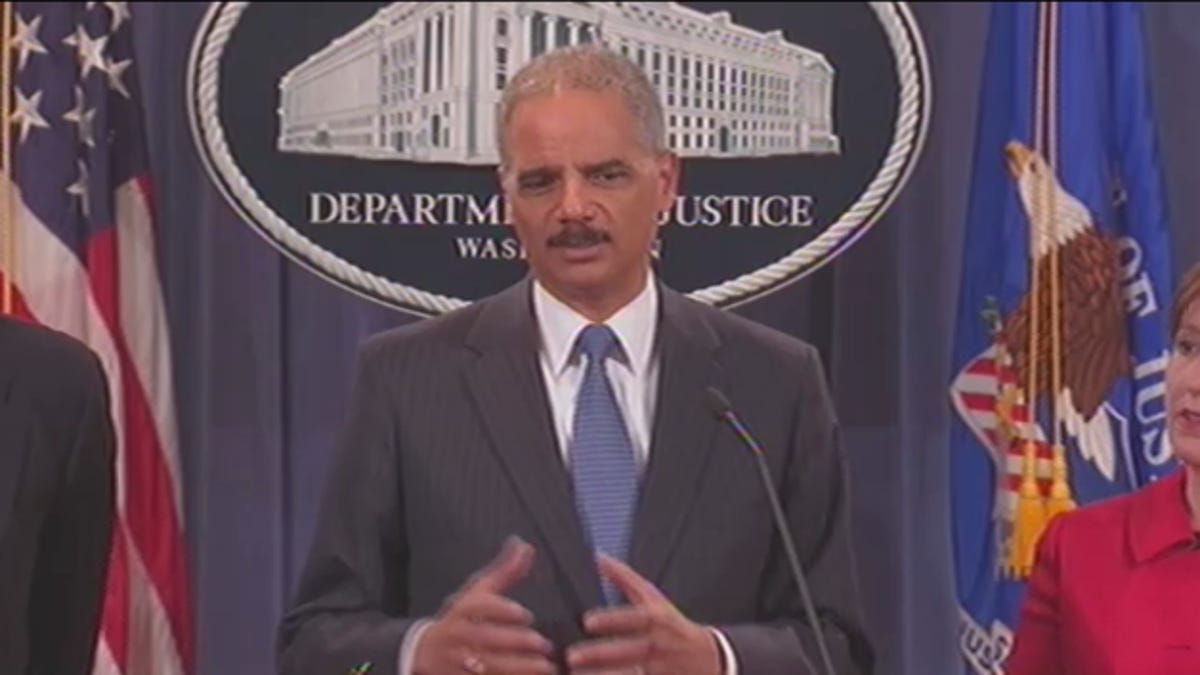DOJ announces three e-book settlements, but not with Apple
E-book publishers Hachette, HarperCollins, and Simon & Schuster have settled allegations of e-book price fixing. Three other companies, including Apple, will square off against the Justice Department in court.

The U.S. Department of Justice confirmed today that it has reached antitrust settlements for alleged e-book price fixing with three large publishers -- but said Apple has chosen to fight the charges in court.
Attorney General Eric Holder said at a press conference this morning (see video below) that the settlement will provide retailers like Amazon and Barnes and Noble the "freedom to reduce the prices of their e-book titles" in the future.
Lagardere SCA's Hachette Book Group, News Corp.'s HarperCollins Publishers, and Simon & Schuster (owned by CBS, which publishes CNET) agreed to settle charges in the antitrust lawsuit that was filed today, Holder said. The settlement must be approved by a New York federal court.
Apple, Macmillan Publishers (owned by Germany's Verlagsgruppe Georg von Holtzbrinck holding company), and Pearson PLC's Penguin Group have not settled the case and have chosen to fight the charges in court, the Justice Department said.
Apple declined to comment when contacted by CNET today. An Amazon spokesman said: "This is a big win for Kindle owners, and we look forward to being allowed to lower prices on more Kindle books."
Macmillan CEO John Sargent denied any wrongdoing in a message sent to authors, agents, and illustrators today that was excerpted by The Wall Street Journal. Sargent said he couldn't easily settle charges when "you know you have done no wrong."
"The government's charge is that Macmillan's CEO colluded with other CEO's in changing to the agency model," Sargent wrote. "I am Macmillan's CEO and I made the decision to move Macmillan to the agency model. After days of thought and worry, I made the decision on January 22, 2010 a little after 4 a.m., on an exercise bike in my basement. It remains the loneliest decision I have ever made, and I see no reason to go back on it now."
The increased popularity of Apple's iPad prompted some publishers to shift from the so-called wholesale model, where retailers set prices, to the agency model, where publishers set prices. Since that happened in 2010, prices that consumers pay for e-books have generally risen and Amazon and other online book sellers who discount have been under pressure.
That's what appears to have drawn the attention of the Justice Department's antitrust attorneys. "We will pursue vigorously our claims against these companies" that refused to settle, acting assistant attorney general Sharis Pozen said.
The proposed settlement also requires the three e-book publishers to stop "placing constraints" on retailers' ability to offer discounts to consumers for two years; to stop sharing "competitively sensitive information" with competitors for five years; and to implement an "antitrust compliance program."
According to the Justice Department's version of events (see complaint embedded below) -- and these remain, of course, mere allegations not reviewed by a judge -- top executives of the six companies were worried that Amazon and other e-book sellers "had reduced prices." As a result, they came up with a plan during regular meetings to "raise, fix, and stabilize retail prices."
Pozen quoted part of a statement that the late Apple CEO Steve Jobs allegedly made to biographer Walter Isaacson:
We told the publishers, "We'll go to the agency model, where you set the price, and we get our 30 percent, and yes, the customer pays a little more, but that's what you want anyway."
They went to Amazon and said, "You're going to sign an agency contract or we're not going to give you the books."
"These executives knew full well what they were doing," Pozen said today. "That is, taking steps to make sure the prices consumers paid for e-books were higher."
U.S. antitrust law defines price fixing as an agreement between competitors to raise or fix prices, even if the prices aren't exactly the same. In this case, the Justice Department is alleging what's known as "horizontal" price fixing, meaning that competitors agree on what prices (or what range of prices) to charge.
On the other hand, not all prices that are similar are the result of price fixing, a point that defense attorneys are sure to raise. A competitive market can also result in similar price movements up and down, especially when the products are similar or are commodities.
The move to an agency model will lead to more diversity among sellers, according to Maja Thomas, a senior vice president of digital at Hachette. Speaking on a panel at the On Copyright conference two weeks ago, Thomas said the company's move to an agency model would help stimulate competition and lead to more price flexibility. Without that shift, she said, independent bookstores would find it difficult to compete.
CNET's Greg Sandoval contributed to this report.

